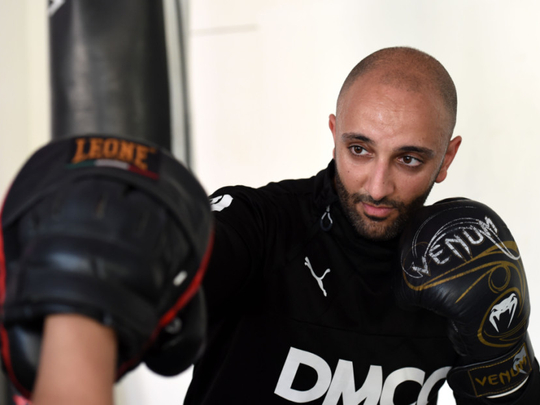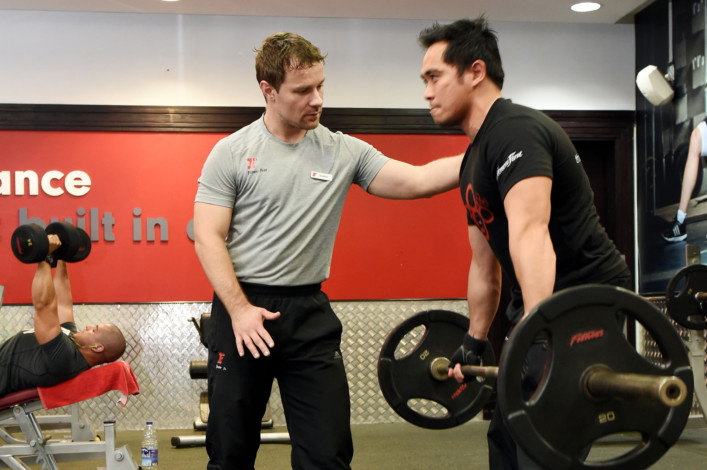
“When I’m winning I am not afraid of anything.”
— Goran Ivanisevic (1996)
“I felt like a long lasting battery that never stops.”
— Thomas Muster (1997)
“No I wasn’t worried… I knew I would win.”
— Martina Hingis (2001)
“It was really hard to sleep, and with adrenaline in your blood it’s difficult to sleep.”
— Novak Djokovic (2010)
If you’ve heard the winners at Dubai Duty Free Tennis Championships over the years, you’d think it was easy for them to beat their opponents. But the case is not so, as two Dubai-based fitness experts tell us.
“As a professional athlete I was trained to create the thought of being a winner, to completely focus on my goal, both individually and as a team player,” says Vladislav Frakas.
Frakas was a member of the national Serbian rugby team from 1999 to 2003 and then in the national squash team from 2005 to 2011.
Since he was young, he trained in other sports such as karate, tennis, football, too. He has a Masters degree in Physical Sports science and has been a squash coach at Fitness First, Meadows Club, since last year.
“When you are in a team, on one level your responsibility is shared because there are others in the team. On another level, the personal onus increases because when the team functions well together, one error on your part can cost the whole team. But when you are in an individual sport, such as tennis or squash, or an athletic discipline such as sprinting, javelin or long jump, then you are by yourself on the court or in the field. You need to consider yourself, your position, your game plan. Plus, each discipline entails different kinds of physical and mental preparation”.
What a player in an individual sport is bogged down most is by fear of failure, Frakas says.
“You may have seen your opponent’s last game in the semi [finals] from the previous day and doubts start rising in you whether you would be able to perform better than him or her. This then could lead to other issues, such as, sleepless nights, which can leave you feeling unwell on the day of the match or with stiff muscles or higher heart rate, maybe due to nervousness,” says Frakas. “These issues can hamper your performance”.
This is when a coach needs to step in. A coach isn’t there just to take you through tactics and techniques of the game. He needs to recognise and understand what’s best for his trainee or team and become the motivator. “He needs to remind you of your own hard work and bring your focus back to you”.
“[Finding the right coach] is like finding a doctor or a dentist that you really believe can help you get better. It’s the same thing with a coach. The coach has to breathe it, believe in it and in the person who comes to the coach has to trust the process,” says Omar Al Duri, a trainer and nutritionist at Platform 3 in Dubai for the past seven years.
Al Duri coached the Ghana Under 20 international team at the African Nations Cup last year.
“The mindset [of this team] was very different because 70 per cent of [the players] are still based in Ghana, not being exposed to today’s world of football – the limelight, the TV rights, the sponsorship deals – while 30 per cent are already playing in Europe. You can tell just by the body language of this 30 per cent that they are different. They know they are closer, that they can smell what it’s like to be successful, playing for clubs such as Manchester City and Granada.
“Although the rest 70 per cent are heroes in Ghana, no one really knows them outside the country. Initially they were apprehensive to talk to me because, obviously, I’m not Ghanaian, my accent is very different so that’s something to be a little wary of. But when they saw how much effort was put in and how much time was spent with them, making sure they are looked after, that they eat on time, making sure they are being trained, if they are injured, they opened up. I’d show them rotational analysis, show them videos of what was expected of them [as players]. That’s all one side of it," Al Duri said.
He said the team ended up being third in the African Nations Cup and qualified for the Under 20 World Cup, "which is a totally different platform for them to show their talent and show the world that Africa is on the rise".
"But do they think they can really win? They played against Argentina in the World Cup, a match which was more or less written off in favour of Argentina. But they beat the Argentinians. For them it was phenomenal,” says Al Duri, recollecting how the team doctor lifted him on to his shoulders and jumped in the field.
“[This success is] raw, it’s real. But this wouldn’t have been this scenario if I had been working with, say Germany or Brazil. That would have been a different experience because the psychology is completely different [for them]. They are expected to win, not just go far. It’s a whole different mindset,” he said.
Both Frakas and Al Duri agree that the trust between the person and the coach is all essential to success and, sometimes, it may take time and is probably harder to achieve.
“The [coach’s responsibility] most importantly is to keep the player focused and calm,” says Frakas, who considers his first rugby coach Slavisa Milinkovic as his mentor.
“A lot of things that [Milinkovic] said then has helped me even after I stopped being a professional player – even when I became a coach. He taught us to connect [with him, other players and trainees] and assess our mistakes just as much as we did our successes. Also as a coach, when you set the goals for the individual or team, you need to be realistic and specific," he said.
"You need to recognise that the player has potential but may not be ready to play for the next two years or five years and so on. He needs to know when is the right time to push the trainee. He needs to judge whether the individual is ready mentally for whatever reason, whether it’s that he or she is impatient or unable to actually handle the success at that stage in his career, or does he have the physical talent required to succeed,” he added.
Al Duri feels the experience in itself is an education pattern in itself.
“That teaches you things that books can’t teach you. If you succeed too early sometimes you don’t appreciate the value of the journey of getting there and if it takes too long you may get disheartened that it’s too far away. So the mental aspect is a challenge itself which sometimes when we experience failure, it reminds us how wonderful it is too succeed," Al Duri said.
"It is impossible to succeed every time and I think if more the athlete or person facing the challenge realises that, the more they appreciate the actual reward at the end,” he added.
Read Omar Al Duri and Vladislav Frakas’ guide to building a champion here













